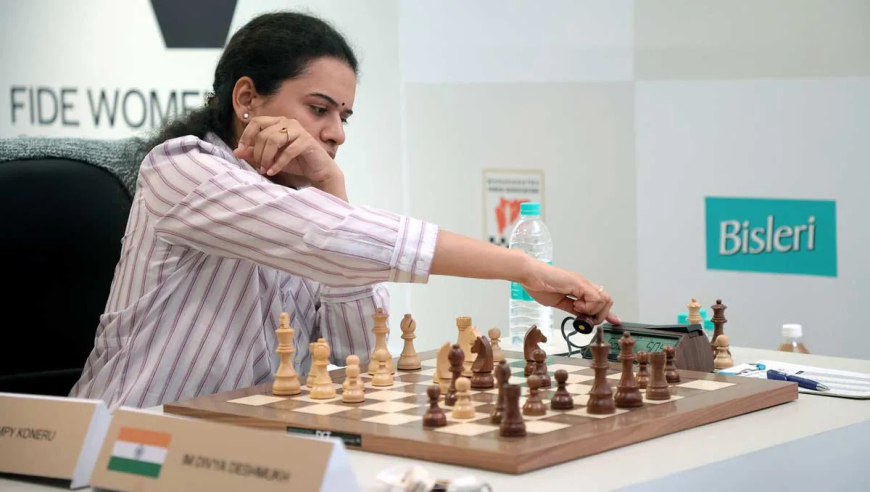Historic All-Indian Final at FIDE Women’s World Cup: Humpy vs. Divya Signals India’s Chess Supremacy
For the first time, two Indian women—Koneru Humpy and Divya Deshmukh—are facing off in the FIDE Women’s Chess World Cup final, guaranteeing India its first champion in the event and cementing its rise in global women’s chess.

In a landmark moment for Indian chess, Koneru Humpy, the nation’s veteran Grandmaster, and 19-year-old prodigy Divya Deshmukh will compete in the final of the FIDE Women’s Chess World Cup 2025 in Batumi, Georgia. This all‑Indian matchup not only guarantees gold and silver medals for India but also represents a generational showdown—Humpy, 38, embodying experience and legacy, versus Deshmukh, the youthful force reshaping India’s global chess narrative The Guardian+15The Federal+15The Times of India+15.
A Historic Moment: What Makes This Final Special
This is the first instance ever that two Indian women have reached the final of the Women's Chess World Cup—a tournament historically dominated by Chinese and Russian players The Times of India. As per tournament rules, both finalists have now secured their spots in the 2026 FIDE Women’s Candidates Tournament, bringing India’s total representation in the elite field to at least two Chess.com+1The Logical Indian+1.
Player Profiles: A Tale of Two Generations
Koneru Humpy – The Consummate Champion
Hailed as India’s most accomplished female chess player, Humpy was the youngest woman ever to become a Grandmaster in 2002, at just 15 years old Instagram+15Wikipedia+15The Federal+15. Her illustrious career includes World Youth and Asian titles, and twice being crowned World Rapid Champion, most recently in 2024. At the World Cup semifinals, she staged a dramatic comeback—surviving tiebreak elimination by beating China’s Lei Tingjie in an eight-game match, sealing a 5–3 victory in the blitz decider with steel nerves and strategic precision The Times of India+7Chess.com+7ESPN.com+7.
Divya Deshmukh – The Rising Star
In contrast, Divya Deshmukh, 19, is on a meteoric rise. Born in Nagpur, she became a Woman Grandmaster in 2021 and an International Master in 2023, capturing gold at the World U20 Girls Championship and an individual bronze at the 2022 Olympiad NDTV Sports+2Wikipedia+2The Federal+2. In Batumi, she delivered clutch wins against China’s former world champion Tan Zhongyi and other top seeds on her path to the final, affirming her title as India’s next chess superstar Wikipedia+15The Federal+15The Indian Express+15.
Road to the Final: Semifinal Highlights
-
Humpy vs. Lei Tingjie: Two draws in classical games led to rapid and blitz tiebreaks. Humpy, under pressure, first won the "win-on-demand" rapid game, then clinched victory in two blitz games to take the match 5–3 Wikipedia+8Chess.com+8FIDE+8.
-
Divya vs. Tan Zhongyi: Deshmukh advanced with a solid performance in classical time control, winning the pivotal second game to confirm her spot in the final—becoming the first Indian woman ever to do so YouTube+11Instagram+11The Times of India+11.
Stakes and Prize Funds
The final begins on Saturday, July 26, with the second classical game on Sunday, July 27, and tiebreaks scheduled for Monday, July 28, if needed. The tournament awards $50,000 to the winner and $35,000 to the runner-up—a substantial reward and global recognition for both finalists The Times of India.
Regardless of the result, India is guaranteed its first-ever Women’s World Cup Champion, a feat celebrated by fans and public figures alike, including industrialist Anand Mahindra, who praised the milestone on social media YouTube+1The Economic Times+1.
What This Means for India’s Chess Movement
Indian Women’s Chess Goes Global
This final underscores India's steady rise as a powerhouse in women’s chess. Breaking the Chinese stranglehold, both participants advanced past top seeds from traditional dominance centers ESPN.comThe Times of IndiaThe Indian Express.
Legacy Meets NextGen
Koneru Humpy represents years of perseverance and excellence while Divya Deshmukh symbolizes the promise of fresh talent and ambition. Their encounter highlights India’s evolving chess culture—one that nurtures legacy while embracing youth.
Strengthening Institutional Support
Both finalists have met qualification criteria for upcoming Candidates Tournaments, assuring India a strong presence in the global championship cycle. Their success may influence FIDE and Indian bodies to invest more in elite-level training for women players The Times of India+15Wikipedia+15The Times of India+15.
Voices from the Semi-finals
Reflecting on her semifinal win, Humpy said:
“It was a very tough match … initially I played quite badly, but after the loss, I was able to come back … Divya has played tremendously well in this whole tournament.” NDTV Sports+9FIDE+9Chess.com+9.
Deshmukh, meanwhile, has expressed pride in setting history and aims to inspire youth in India’s chess pipeline through her breakthrough performance The Times of IndiaThe Times of India.
What’s Next: The Final and Beyond
Tough Chess Ahead
Classical time controls start first; if tied, rapid and blitz games will determine the winner. This format tests not just skill, but adaptability and psychological fortitude.
Candidates and Championship Trajectory
Both Humpy and Deshmukh have secured places in the 2026 Women’s Candidates Tournament, edging closer to challenging reigning World Champion Ju Wenjun in future championship cycles ESPN.com+2Chess.com+2The Times of India+2The Federal+1The Logical Indian+1.
A Rising Cultural Moment
Indian chess is accelerating—2024 saw India win Women’s and Open Olympiad golds. With two finalists at the World Cup, the momentum is reaching new heights ESPN.com.
Conclusion
The FIDE Women’s World Cup 2025 final—featuring an all-Indian match-up between Koneru Humpy and Divya Deshmukh—is a defining moment in Indian chess history. It affirms India’s transition from Olympic-level achievements to full-spectrum global dominance in women’s chess. While Humpy brings experience and legacy, Divya brings youthful daring and aspiration. Their face-off is not just about a title—it is about generations converging to reshape the narrative of Indian chess.
Individually and collectively, they embody India’s rise: a chess nation no longer content with representation but hungry for global leadership. No matter who claims the crown, the triumph belongs to India.




















































